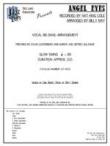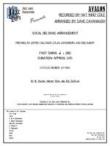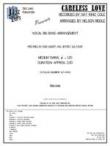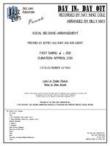Cole, Nat 'King'
Nat "King" Cole was one of the most popular, charismatic, and versatile American entertainment stars of the 20th century. In his 45 years he was a trailblazing jazz piano trio leader, a star of radio, screen, and stage, a songwriter, the first black American to host a weekly TV series, a crusader for equality, and ultimately one of the greatest and most beloved singers of all time.
Nathaniel Adams Coles was born on March 17, 1919 in Montgomery, Alabama. The family moved to Chicago when he was four and his father became minister of the True Light Baptist Church.(1) Born into a musical family, Cole's mother was a church organist and his older brother Eddie was a bassist/pianist. Surrounded by music from an early age, he quickly gravitated to the piano, becoming proficient in gospel, classical, and jazz, giving him the diverse background that would accentuate his ability to appeal naturally to a wide variety of audiences. From the informal music he was immersed in from early childhood to the classical training he soon received, young Nat's aptitude for music was constantly nourished.
He was playing in bands by his teenage years; seeing early jazz piano pioneer Earl Hines had a tremendous influence on him, just as Hines impressed and influenced so many future jazz giants. Cole and his brother Eddie's sextet had their first recording session with Decca in 1936.(2) The band performed in a musical called Shuffle Along; Cole traveled with them and remained in Los Angeles when the show ended there.(3) Cole 's girlfriend, Nadine Robinson, was a dancer in the show; this was a major factor in his winding up in L.A. They married in Michigan before moving to California. After about 11 years of marriage, Cole saw Maria Hawkins sing in 1948 and immediately fell for her. He soon divorced Nadine and married Maria. They would raise a family and remain together for the rest of Cole's life.(4)(5)
Eventually dropping the "s" from his last name, there are various stories about the genesis of the Nat "King" Cole moniker; his Los Angeles piano trio eventually took the name The King Cole Trio in the late 1930s. One legend says it was a supportive club owner who gave him a crown to wear(6); the more popular story today strongly suggests that the trio borrowed it from the old children's nursery rhyme. It worked quite well and remains most appropriate to this day. After Cole hired guitarist Oscar Moore and bassist Wesley Prince, the trio began radio appearances and recordings along with their regular live performances. During this era, Cole largely pioneered the piano-led jazz trio, demonstrating the depth of his talent in showing what a virtuoso pianist with the right accompanists could do in this small-group setting. At the height of the big band era this was especially eye-opening and influential for future greats like Oscar Peterson, Ahmad Jamal, and others who took note of what Cole was able to do with simply guitar and bass; his skills were so formidable that he almost rendered drums unnecessary.(7)
His beginnings as a singer also are somewhat shrouded in mystery; one story says that a drunken patron one night demanded to hear him sing.(8) A more likely one is that a business-minded club owner beseeched him to give his fans what they wanted, and to sing Sweet Lorraine.(9) Other sources simply suggest that early on Cole would sing on request in between the Trio's sets, and people really enjoyed it.(10) Whichever was the case, he did sing Sweet Lorraine, and recorded it in 1940 for his first hit.(11) While not possessing the physical vocal wizardry of some star singers, Cole's warm, intimate, emotionally soothing sound immediately began making its mark, and the move from instrumentalist to singing sensation was a very natural progression. He had a way of immediately drawing one in with his voice; not shocking with his range, or dazzling with the most unique phrasing-more just making every listener feel like he was singing directly to them, and in the most comforting way.
In the coming years, Cole's career had a unique bifurcation. Already established as a great jazz pianist by the mid 1940s, having been a part of the early Jazz at the Philharmonic concerts, and working with such notables as Lester Young, his transition to jazz/pop vocal superstar greatly enhanced his profile while at the same time upsetting often highly protective and conservative jazz purists. The singing remained just a part of the act for a while, but when he had a major hit on several charts in 1944 with his Straighten Up and Fly Right, Cole's musical life began to take a dramatic turn. As he shifted his focus to singing, over the course of the rest of the 1940s he cemented his status as one of America's most popular vocalists.
1947's The Christmas Song became one of the most enduring holiday classics and remains so to this day. (Get Your Kicks) On Route 66, Nature Boy, Mona Lisa, Orange Colored Sky, Too Young, and other hits made him a bona fide cultural superstar by the early 1950s. He began touring the world, having residencies at Las Vegas casinos as that city become an entertainment mecca, recording with arrangers such as Nelson Riddle and Billy May, performing at the Cavalcade of Jazz, taking small acting roles, and charting song after song.
It is said that Cole's trio was the first African-American group to have its own sponsored radio show. His star became so bright that in 1956 he became the first African-American to have his own regular weekly television program, The Nat King Cole Show. Racial attitudes being what they were in America at that time, the show sadly did not find a sponsor, and was cancelled after a year; Cole dryly commented that "Madison Avenue is afraid of the dark."(12) Cole had been attacked on stage by violent racists in Alabama in 1956, and refused to return to the area or to play other locations in the still very segregated South. Cole and the civil rights movement has been an area of controversy; despite receiving criticism from some civil rights figures during the early part of the era for not being vocal or active enough, Cole was indeed an activist from the beginning. He felt that his path to force change was via the arts. In addition to the aforementioned achievements, he was the first black star to achieve the level of popularity enjoyed by white singers such as Frank Sinatra and others; this by definition paved the way for others. He settled into a home in an affluent all-white area of Los Angeles; when neighbors suggested that they did not want "undesirables" in the area, Cole boldly responded, "Neither do I. And if I see anybody undesirable coming in here, I'll be the first to complain."(13). He did play for all-white audiences on occasion, but eventually ceased that practice, and he also sued hotels that refused to allow him and his family to stay at the same place he was performing.(14) By the 1960s he had become an ardent supporter of the civil rights movement and this intensified as the decade moved on; he donated to it generously, and used his celebrity to work with presidents Kennedy and Johnson in this area and help plan the 1963 March on Washington.(15) Ultimately, Cole felt that he could do more with his art than by being outspoken; his daughter Timolin quoted him as saying, "I may be able to bring harmony among people with my music."(16)
The latter part of the 1950s saw Cole record a #1 album with Gordon Jenkins, the still-popular Love is the Thing. Critics and Cole's wife Maria felt that Jenkins's style worked better with Cole than perhaps any other of the great arrangers he collaborated with.(17) Cole recorded albums in Spanish, as he had played in Cuba and his popularity spread throughout Latin America. He also recorded in French and Portuguese, simultaneously expanding his fan base and showing gratitude for those in various parts of the world who already loved his artistry.(18) In the late 1950s he increased his involvement in Hollywood, eventually starring as W.C. Handy in St. Louis Blues in 1958. He also developed a stage show that he toured with for years as well.(19)
By the end of the decade, as rock and roll was well into its ascendancy, singers like Cole, Sinatra, and Dean Martin sometimes struggled with changing tastes, as newer, younger music flooded the charts. Cole continued his busy schedule and hit it big again with 1962's Ramblin' Rose, which was very popular with pop and even country audiences.(20) He continued recording and touring through the early 1960s, finishing what would be his final album, L-O-V-E, in December of 1964. It would peak at #4 on the charts the following spring.
A heavy smoker who believed that cigarettes helped give his voice its unique qualities,(21) Cole began to suffer various ailments in the fall of 1964. When he did have himself examined, advanced lung cancer was discovered and the prognosis was daunting. He finished L-O-V-E with Ralph Carmichael in early December, and began intense treatment shortly thereafter.(22) Cole spent the new year at home with family, basking in the incredible flood of well-wishing mail he had received. Back in the hospital, he was deeply shaken by the death of his father on February 1. Despite his publicists' optimism which heartened the public, Cole's condition continued its irreversible decline, and he passed away at the young age of 45 on February 15, 1965. The outpouring of grief for a man who meant so much to so many was gargantuan. According to Daniel Mark Epstein's landmark 1999 biography, honorary pallbearers included Robert F. Kennedy, Count Basie, Frank Sinatra, Sammy Davis Jr., Johnny Mathis, George Burns, Danny Thomas, Jimmy Durante, Frankie Laine, Steve Allen, and California Governor Pat Brown; Cole's close friend Jack Benny gave the eulogy.(23) Nat King Cole was buried at Forest Lawn Cemetery with so many other celebrities, eventually joined there by Maria and daughter Natalie.(24)
Cole and his wife Maria were very close; she had given up her singing career to raise a family, their first child being Natalie, who eventually became a star in her own right. Maria once said that “Nat wanted to improve himself...I wanted to help him improve. What he needed, I had. What I needed, he had. That’s why our marriage worked.”(25) Gordon Jenkins's son Bruce's moving biography of his father has passages that show how deeply Maria understood music and especially what her husband both brought to a session and desired: "...Gordon was the only person who could do those things with strings, to really embellish what (Nat) was doing on ballads...the only person (Nat) worked with where he was totally at ease...the arrangements were just there, perfect, and you can hear it in the records. I always felt Gordon had in his music what Nat had in his voice, and they really were wedded."(26) It's easy to imagine how their first child wound up as an international star selling tens of millions of records. Natalie's parents and her uncle Freddie were all jazz singers, but she forged her own path in R&B, eventually finding her greatest success with 1991's Unforgettable...With Love. Not always comfortable singing tunes her father was known for, this album became a huge hit for her, and the track of the two of them singing Unforgettable together won Grammys of its own; the project re-established her stardom and also both burnished her father's profile and introduced him to many new listeners.
Nat King Cole left behind one of the great legacies, bodies of work, and life stories in the American arts. The honors have never stopped, decades after his passing. He's received a Grammy Lifetime Achievement Award. He has been inducted into the Rock and Roll Hall of Fame for his influence on early rock, as well as the DownBeat Hall of Fame for his stature in jazz piano and singing. The US Postal Service issued a stamp in his honor in 1994. The iconic Capitol Records Building in L.A. is often called "The House That Nat Built" in tribute to his contribution to the legendary label's growth and success. Cole worked to bring African-American artists to the forefront of every area of the arts as well as American life in general at a time when racism haunted America in an intense, vicious manner. He is a central part of the American holiday season thanks to his version of The Christmas Song, a holiday essential that he brought to the fore with his initial recordings of it. He is ardently beloved by two largely mutually exclusive bodies of fans; he remains a jazz icon for his piano work, especially the early trio days, as well as his singing. Yet he is a cultural icon to the massive world of pop music fandom as well, for his dozens of magnificent hits, sung in his inimitable manner and tone. Cole, like Sinatra, left a mark very much his own on some central tunes in the Great American Songbook; Unforgettable, When I Fall in Love, Straighten Up and Fly Right, Almost Like Being in Love, and especially The Christmas Song. The eternal power and presence of his voice is shown so vividly in his conjuring the timeless warmth and glow of the holiday season with vivid emotional depth as he sings: "Chestnuts roasting on an open fire..." There are not many American songs that begin this memorably and have had such incredible staying power.
From humble beginnings, the great Nat Cole worked his way to the very core of the American Experience and forged a path that left him at the center of our cultural consciousness; a place that he will never leave.
Notes:
1-https://timesmachine.nytimes.com/timesmachine/1965/02/16/101527424.pdf?pdf_redirect=true&ip=0
2-https://www.allmusic.com/artist/nat-king-cole-mn0000317093/biography
3-https://www.allmusic.com/artist/nat-king-cole-mn0000317093/biography
4-https://www.allmusic.com/artist/nat-king-cole-mn0000317093/biography
5-https://en.wikipedia.org/wiki/Nat_King_Cole#cite_note-43
6-https://timesmachine.nytimes.com/timesmachine/1965/02
/16/101527424.pdf?pdf_redirect=true&ip=0 7-https://lasentinel.net/nat-king-cole.html#:~:text=Cole%20was%20a%20heavy%20smoker,recording%20for%20that%20very%20purpose).
8-https://en.wikipedia.org/wiki/Nat_King_Cole#cite_note-Intimate-17
9-https://timesmachine.nytimes.com/timesmachine/1965/02
/16/101527424.pdf?pdf_redirect=true&ip=0 10-https://lasentinel.net/nat-king-cole.html#:~:text=Cole%20was%20a%20heavy%20smoker,recording%20for%20that%20very%20purpose).
11-https://en.wikipedia.org/wiki/Nat_King_Cole#cite_note-Yanow_Swing-16
12-https://en.wikipedia.org/wiki/Nat_King_Cole#cite_note-34
13-https://en.wikipedia.org/wiki/Nat_King_Cole#cite_note-Levinson2005-44
14-https://progressive.org/latest/nat-king-cole-trailblazer-unforgettable-way/
15-https://en.wikipedia.org/wiki/Nat_King_Cole#cite_note-Gilbert1988-50
16-https://www.newsweek.com/nat-king-cole-100-years-centenary-jazz-civil-rights-1364966#:~:text=Once%20attacked%20on%20an%20Alabama,to%20The%20Los%20Angeles%20Times.
17-https://en.wikipedia.org/wiki/Love_Is_the_Thing
18-https://lasentinel.net/nat-king-cole.html#:~:text=Cole%20was%20a%20heavy%20smoker,recording%20for%20that%20very%20purpose).
19-https://www.allmusic.com/artist/nat-king-cole-mn0000317093/biography
20-https://en.wikipedia.org/wiki/Ramblin%27_Rose
21-https://lasentinel.net/nat-king-cole.html#:~:text=Cole%20was%20a%20heavy%20smoker,recording%20for%20that%20very%20purpose)
22-https://en.wikipedia.org/wiki/Nat_King_Cole#cite_note-55
23-https://en.wikipedia.org/wiki/Nat_King_Cole#cite_note-FOOTNOTEEpstein1999360-66
24-https://en.wikipedia.org/wiki/List_of_burials_at_Forest_Lawn_Memorial_Park_(Glendale)
25-https://www.nytimes.com/2012/07/14/arts/music/maria-cole-jazz-singer-and-wife-of-nat-dies-at-89.html
26-Bruce Jenkins, Goodbye: In Search of Gordon Jenkins, (Berkeley CA, Frog, Ltd, 2005), Pgs 190-191

NAT 'KING' COLE JAZZ LINES PUBLICATIONS SERIES: TEN ARRANGEMENT SET
NEWLY UPDATED FOR JUNE 2022!
Arranged by Nelson Riddle, Billy May, Dave Cavanaugh, and Pete Rugolo
Ten Jazz Big Band Arrangements With Vocal
Jazz Lines Publications
JLP-1033
$575.00
NAT 'KING' COLE JAZZ LINES PUBLICATIONS SERIES: TEN ARRANGEMENT SET [DOWNLOAD]
Arranged by Nelson Riddle, Billy May, Dave Cavanaugh, and Leo Shuken
Ten Jazz Big Band Arrangements With Vocal
Jazz Lines Publications
JLP-1033-DL
$575.00
Recorded by Nat 'King' Cole
Jazz Big Band Arrangement with Vocal
Jazz Lines Publications
JLP-9835
$75.00
ALMOST LIKE BEING IN LOVE [DOWNLOAD]
Recorded by Nat 'King' Cole
Jazz Big Band Arrangement with Vocal
Jazz Lines Publications
JLP-9835-DL
$75.00
Recorded by Nat 'King' Cole
Jazz Big Band Arrangement with Vocal
Jazz Lines Publications
JLP-9552
$75.00
Recorded by Nat 'King' Cole
Jazz Big Band Arrangement with Vocal
Jazz Lines Publications
JLP-9552-DL
$75.00
Recorded by Nat 'King' Cole
Jazz Big Band Arrangement with Vocal
Jazz Lines Publications
JLP-9518-DL
$75.00
Recorded by Nat 'King' Cole
Jazz Big Band Arrangement with Vocal
Jazz Lines Publications
JLP-9346
$75.00
Recorded by Nat 'King' Cole
Jazz Big Band Arrangement with Vocal
Jazz Lines Publications
JLP-9346-DL
$75.00
CHRISTMAS SONG, THE (CHESTNUTS ROASTING ON AN OPEN FIRE)
Recorded by Nat 'King' Cole
Jazz Studio Orchestra Arrangement with Vocal
Jazz Lines Publications
JLP-9539
$75.00
CHRISTMAS SONG, THE (CHESTNUTS ROASTING ON AN OPEN FIRE) [DOWNLOAD]
Recorded by Nat 'King' Cole
Jazz Studio Orchestra Arrangement with Vocal
Jazz Lines Publications
JLP-9539-DL
$75.00
Recorded by Nat 'King' Cole
Jazz Big Band Arrangement with Vocal
Jazz Lines Publications
JLP-9813
$75.00
Recorded by Nat 'King' Cole
Jazz Big Band Arrangement with Vocal
Jazz Lines Publications
JLP-9813-DL
$75.00
Recorded by Nat 'King' Cole
Jazz Studio Orchestra Arrangement with Vocal
Jazz Lines Publications
JLP-9833
$75.00
Recorded by Nat 'King' Cole
Jazz Studio Orchestra Arrangement with Vocal
Jazz Lines Publications
JLP-9833-DL
$75.00
Recorded by Nat 'King' Cole
Jazz Studio Orchestra Arrangement with Vocal
Jazz Lines Publications
JLP-6009
$55.00
Recorded by Nat 'King' Cole
Jazz Studio Orchestra Arrangement with Vocal
Jazz Lines Publications
JLP-6009-DL
$55.00
Recorded by Nat 'King' Cole
Jazz Big Band Arrangement
Jazz Lines Publications
JLP-6013
$75.00
Recorded by Nat 'King' Cole
Jazz Big Band Arrangement
Jazz Lines Publications
JLP-6013-DL
$75.00
Recorded by Nat 'King' Cole
Jazz Big Band Arrangement
Jazz Lines Publications
JLP-6015
$75.00
Recorded by Nat 'King' Cole
Jazz Big Band Arrangement
Jazz Lines Publications
JLP-6015-DL
$75.00
I'M GONNA SIT RIGHT DOWN AND WRITE MYSELF A LETTER
As Recorded by Nat 'King' Cole
Jazz Big Band Arrangement With Vocal
Lush Life Music
LL-2388
$65.00














